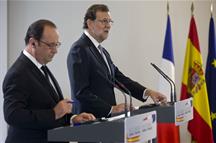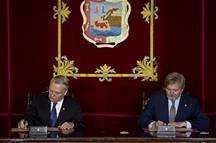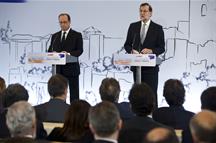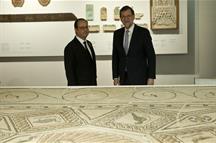25th Spain-France Summit
Mariano Rajoy asserts that pro-Europeans are "more united" and want "more integration than ever before"
President's News - 2017.2.20
1. Mariano Rajoy and François Hollande arrive at Malaga town hall at the beginning of the 25th Spain-France Summit | Pool Moncloa / Marcos Martín / Jorge Villar - 2017.2.20
-
 02:49
1. Mariano Rajoy and François Hollande arrive at Malaga town hall at the beginning of the...
02:49
1. Mariano Rajoy and François Hollande arrive at Malaga town hall at the beginning of the...
-
 04:35
2. Mariano Rajoy and François Hollande viewed several rooms of Malaga Museum
04:35
2. Mariano Rajoy and François Hollande viewed several rooms of Malaga Museum
-
 02:22
3. Sectoral meetings between the Ministers and the State Secretaries
02:22
3. Sectoral meetings between the Ministers and the State Secretaries
-
 02:30
4. Signing of agreements between the Spanish and French delegations at Malaga town hall
02:30
4. Signing of agreements between the Spanish and French delegations at Malaga town hall
Malaga
At the press conference offered in Malaga with the President of the French Republic, François Hollande, Mariano Rajoy underlined the importance of relations between the two countries, whose governments "have understood each other very well" in recent years. The President of the Government specifically referred to their collaboration in the fight against terrorism and economic relations: France is the leading customer of Spanish companies and the second-largest country for inbound tourists to Spain.
François Hollande, who also highlighted the strong economic ties and high degree of convergence on political issues between France and Spain, invited Mariano Rajoy to take part in a meeting in Versailles on 6 March. This meeting will be held with a view to the European Council meeting to be held on 9 and 10 March and to the commemoration of the 60th anniversary of the Treaty of Rome, on 25 March. The meeting will also be attended by the German Chancellor, Angela Merkel, and the Italian Prime Minister, Paolo Gentiloni.
The two leaders underlined the close ties in all areas that prevail between Spain and France. "We are partners, friends and neighbours; we are European and Mediterranean countries with centuries of shared history behind us and a common future together as leading players in the European integration process", declared Mariano Rajoy.
Commitment to European integration
 Pool Moncloa/ Diego CrespoDuring the summit, Mariano Rajoy and François Hollande tackled the current situation and the outlook for the European project. The President of the Government of Spain recalled that during the 60 years prior to the Treaty of Rome, there were two world wars in Europe; since then, he stated, "it has become a space for peace, liberty, democracy and human rights", the leading trading and economic power in the world and the place "which best cares for its citizens".
Pool Moncloa/ Diego CrespoDuring the summit, Mariano Rajoy and François Hollande tackled the current situation and the outlook for the European project. The President of the Government of Spain recalled that during the 60 years prior to the Treaty of Rome, there were two world wars in Europe; since then, he stated, "it has become a space for peace, liberty, democracy and human rights", the leading trading and economic power in the world and the place "which best cares for its citizens".
According to Mariano Rajoy, Europe must continue to focus on those issues of greatest concern to its citizens, as was agreed at the Bratislava Summit last year. He specified that these priorities are immigration, the fight against terrorism, external security and defence, and economic growth and job creation in order to strengthen the Welfare State.
However, in addition to attending to current problems, Europe must also look to the future, stressed the President of the Government of Spain. Mariano Rajoy advocated a continued commitment to the single market, in particular in relation to the single energy market and the digital single market, to making progress on the economic and monetary union and to moving towards fiscal union.
"In the wake of the events that have taken place recently, the time has now come for those of us who believe in Europe to send out our message loud and clear - we are more united than ever, we want more integration than ever and we live in the region of the world with the highest standard of living", he claimed.
Bilateral agreements
In parallel to the meeting between Mariano Rajoy and François Hollande, seven ministers from the Spanish Government held bilateral meetings with their French counterparts. As a result of the summit, the two countries reached a series of agreements on various issues that are contained in the annexe to the Joint Summit Declaration. Pool Moncloa/ Diego Crespo
Pool Moncloa/ Diego Crespo
Among the bilateral issues, the President of the Government of Spain mentioned the agreement "to assign and transfer the documentation accumulated by the French courts over the years in the fight against the terrorist group ETA to Spain". He explained that it is a very significant amount of information covering the reports and investigations carried out.
Mariano Rajoy thanked President Hollande and the French Minister for Justice, "because this will allow us to continue with our work on memory, dignity and justice" that the victims of terrorism deserve. All the documentation and evidence will form part of the resources of the Memorial on the Victims of Terrorism being set up in the city of Vitoria.
Interconnections and transport networks
The President of the Government also reviewed the progress made in the field of energy interconnections. As regards the electricity project in the Bay of Biscay, he pointed out that a feasibility study has already been drawn up and that the next step is for the French electricity transporter to notify the French regulator and Government, and that "he has given instructions so that things can proceed swiftly". The project will be presented this year in order to receive European funding.
The summit was also used to discuss electricity and gas connections through the Pyrenees. Mariano Rajoy pointed out that the studies will continue according to schedule and that the plan is to present projects in 2018.
The meeting also boosted some actions in relation to the Trans-European Transport Networks, particularly railway networks. As regards the Mediterranean Corridor, Mariano Rajoy pointed out that Spain is working on various stretches and that the next milestones will be the execution of such stretches as Castellon-Valencia, access to Murcia and Tarragona-Vandellós; for its part, France will connect Nimes with Montpellier this year and will then continue with the work towards the border.
As regards the Atlantic Corridor, Mariano Rajoy stated that last weekend works started to implement the international-gauge track on the stretch between Donostia and Irun and that work will continue on the Basque 'Y', while the stretch between Bordeaux and Dax has been declared to be in the public interest.
Current affairs
 Pool Moncloa/ Diego CrespoIn response to questions from journalists on talks between the government and the Regional Government of Catalonia, Mariano Rajoy reiterated that the government's top priority is to talk about "the real problems that concern our citizens as a whole", in particular the people of Catalonia, among which he cited regional financing, long-term care, infrastructure and investment. In this regard, he regretted that the President of the Regional Government of Catalonia, Carles Puigdemont, did not attend the Conference of Regional Presidents held on 17 January in the Upper House of Parliament, at which these issues were discussed.
Pool Moncloa/ Diego CrespoIn response to questions from journalists on talks between the government and the Regional Government of Catalonia, Mariano Rajoy reiterated that the government's top priority is to talk about "the real problems that concern our citizens as a whole", in particular the people of Catalonia, among which he cited regional financing, long-term care, infrastructure and investment. In this regard, he regretted that the President of the Regional Government of Catalonia, Carles Puigdemont, did not attend the Conference of Regional Presidents held on 17 January in the Upper House of Parliament, at which these issues were discussed.
The second priority, according to Mariano Rajoy, is for institutions to represent their citizens as a whole regardless of who they voted for. Institutions, he said, "cannot only serve one specific ideology, in this case the pro-independence movement; that situation must be rectified".
The President of the Government pointed out that the third priority is "not to further divide Catalan society" because the debate triggered over the last five years "has affected internal cohesion and has not contributed anything new or positive to the life of the citizens of Catalonia".
In reference to the fourth main priority, Mariano Rajoy underlined that, "in the times we live in, we cannot leave the Regional Government of Catalonia in the hands of a radical and extremist political force. These political forces should not be able to appoint or dismiss Regional Governments of Catalonia, because this is very bad for the democratic health of institutions and countries".
Mariano Rajoy added that he is prepared to talk about these four future priorities, but not about "how to eliminate national sovereignty or about how to jointly break the law".
When asked about relations between Morocco and the European Union after the attempts to scale the fence in Ceuta in recent days, the President of the Government thanked the law enforcement agencies of this country for their collaboration and stressed that "relations between the Governments of Spain and Morocco are excellent and at their best level ever". "I believe that these relations benefit the people of Morocco, the people of Spain and also the people of Europe as a whole", he concluded.
Cultural agenda
 Pool Moncloa/ Diego CrespoWithin the framework of the summit, Mariano Rajoy and François Hollande viewed several rooms of Malaga Museum given over to the archaeology of the Carthaginian culture.
Pool Moncloa/ Diego CrespoWithin the framework of the summit, Mariano Rajoy and François Hollande viewed several rooms of Malaga Museum given over to the archaeology of the Carthaginian culture.
Together with the French and Spanish delegations, the two heads of government also visited the Pompidou Centre in Malaga; this year the headquarters of the centre in Paris is celebrating its 40th anniversary.
Mariano Rajoy and François Hollande described the artist from Malaga, Pablo Picasso, and the Pompidou Centre as symbols of relations between the two countries.






